The 5 Healthiest Oils to Cook With—and 5 To Avoid
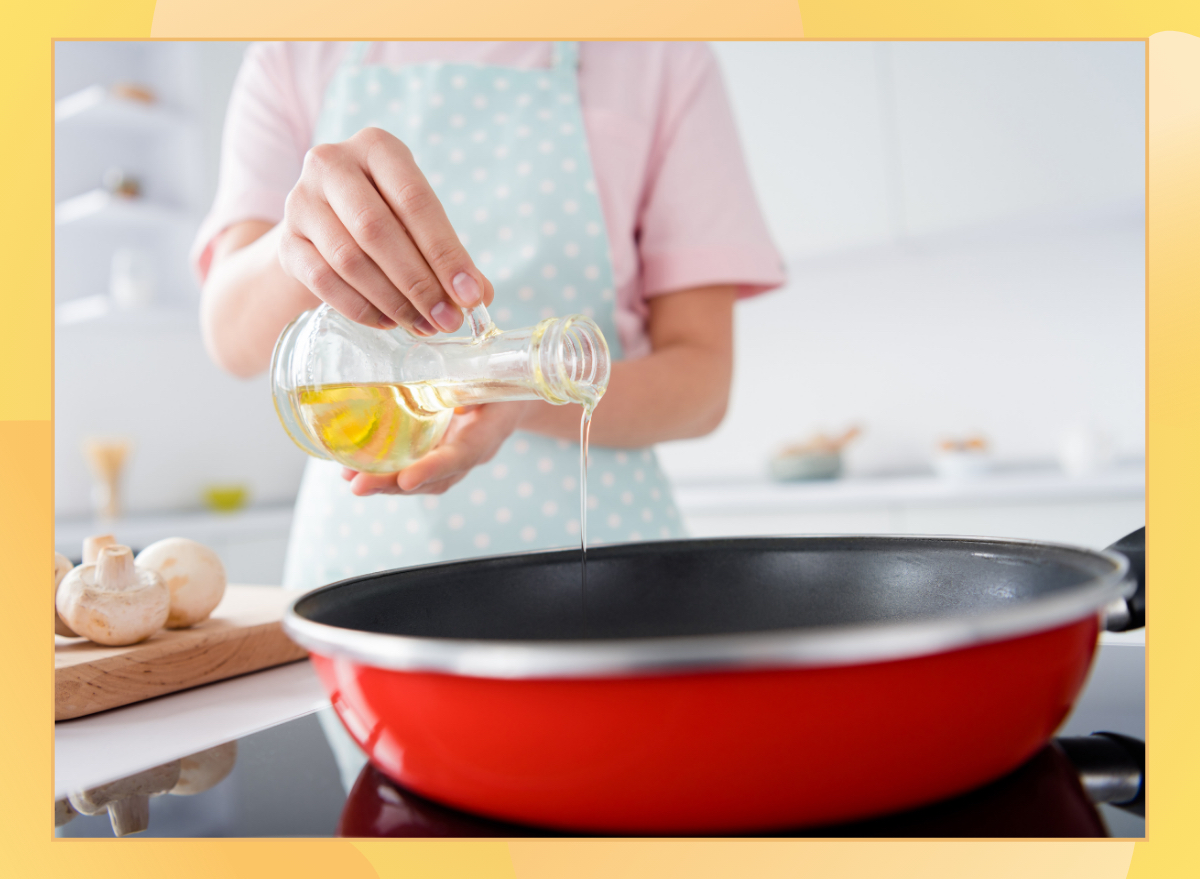
Cooking oil is a pantry staple that is used in the preparation of countless recipes. Whether you’re sautéing veggies, marinating meats, or whipping up a batch of cookies, chances are you’re reaching for a bottle of oil.
Take a peek in your pantry, and you’ll likely find an assortment of options at your disposal. But not all oils are created equal—some fare better in high heat, while others shine in salad dressings. The recipe isn’t the only thing that determines which oil you should use; oils have varying nutrient compositions, which plays another role in choice.
Despite sharing a similar caloric content (around 120 calories per tablespoon), cooking oils differ in their nutrient makeup, particularly in their fat composition. While some have higher amounts of unsaturated fat, others have a larger makeup of saturated fat. Even within the unsaturated fat category, different types of fats, such as monounsaturated and polyunsaturated, help determine how beneficial the oil is for your health.
In this guide, we’ll break down the top 5 healthiest oils for cooking and highlight 5 to steer clear of. Read on to learn more about the oils you’re likely using in your cooking and how they can affect your health.
The 5 Healthiest Oils to Cook With
Best: Extra-Virgin Olive Oil
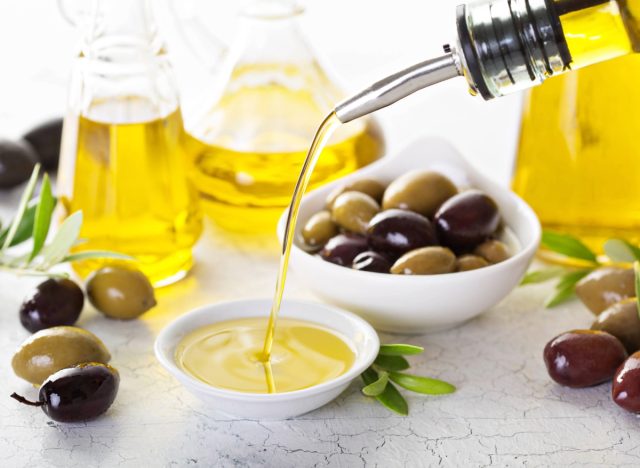
A kitchen staple, you have likely heard extra-virgin olive oil is a heart-healthy option. Not only is olive oil versatile, earning its place in cold and hot recipes, and baked goods, but it is also rich in unsaturated fat and vitamin E.
The main type of unsaturated fat in olive oil is called oleic acid. This monounsaturated fat appears to possess many benefits, including a protective effect against insulin resistance and anti-inflammatory function. Additionally, the vitamin E in olive oil serves as an antioxidant and has shown to be effective against many diseases and conditions. Use olive oil to make your own homemade salad dressing, when sauteing veggies over medium heat, or as a healthier alternative to butter in your baked goods.
Best: Avocado Oil
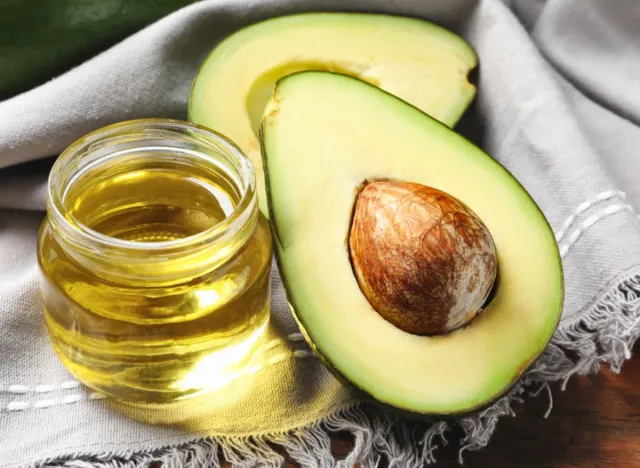
Known for its high smoke point of 520 degrees Fahrenheit, avocado oil is great for high-heat cooking, like frying. It also has a subtle flavor which allows it to be used in sweet and savory cooking and baking. Similar to olive oil, avocado oil has a high composition of oleic acid, making it a healthy source of fat.
In one study, avocado oil intake was associated with a reduction in triglyceride and LDL cholesterol levels. High levels of these blood markers can increase your risk for heart health issues. You can use avocado for pan-frying, deep frying, roasting, and baking, as well as cold applications, like salad dressing and homemade mayonnaise.
Best: High Oleic Sunflower Oil
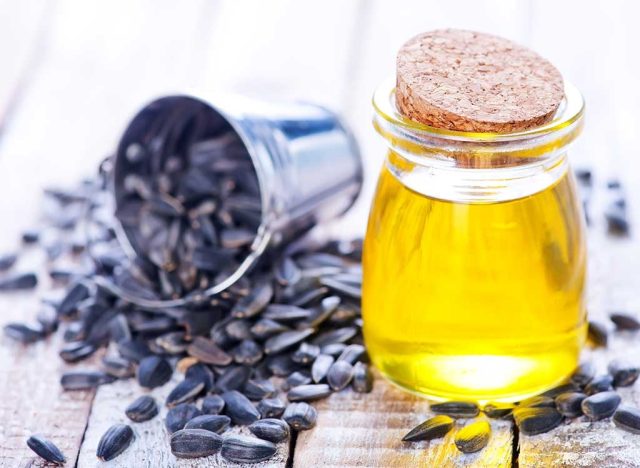
Sunflower oil contains unsaturated fats, making it a healthier option than some oils. However, it’s important to note that these unsaturated fats primarily consist of Omega-6 fatty acids, which can raise some health concerns. Omega-6 is essential for our bodies, but excessive intake may lead to inflammation and consequent health issues.
On the bright side, high oleic sunflower oil offers a solution, boasting a lower Omega-6 content alongside a high concentration of oleic acid. This combination renders high oleic sunflower oil a healthy option that can be used in pan-frying and sauteing, as well as an alternative to butter in baking.
Best: Sesame Oil
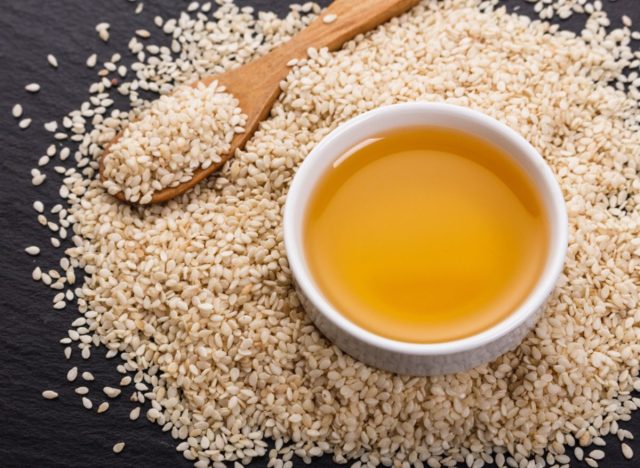
The notable nutty flavor of this oil makes it a little less versatile in cooking and baking. However, it can still be enjoyed in a variety of dishes and appears to provide some health benefits.
Sesame oil is a source of antioxidants which are compounds that protect your cell health. This oil also has anti-inflammatory properties that may reduce the risk of heart health issues, like atherosclerosis. There is even research that suggests sesame oil may be able to alleviate discomfort associated with osteoarthritis. Asian-inspired dishes, like stir-fries and noodle dishes, are great ways to incorporate sesame oil into your cooking. You can also use this oil in marinades and dips, like hummus.
Best: Peanut Oil
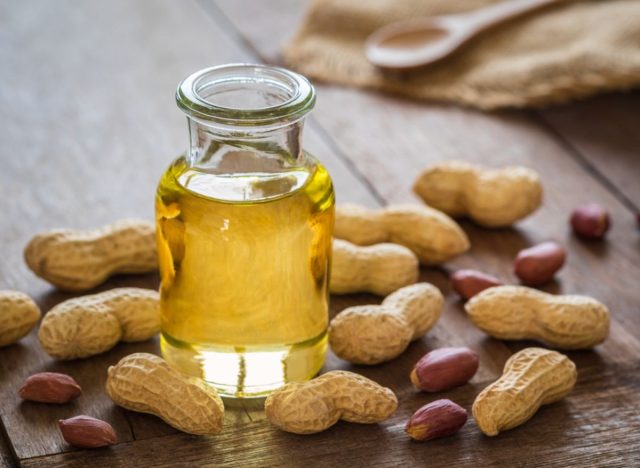
While peanut oil does come with some drawbacks, it does possess plenty of potential health benefits. Firstly, it’s rich in oleic acid, a feature shared by many oils on our list known for their health benefits. Additionally, peanut oil is a good source of vitamin E, providing antioxidant properties. Unsaturated fats, like those found in peanut oil, may also aid in blood sugar control.
However, it’s important to note that peanut oil also contains inflammatory Omega-6 fatty acids. Excessive consumption of Omega-6 while lacking Omega-3 can negatively affect your health, so it is best to limit your sources of Omega-6 fats. Despite this, given its nutritional profile, keeping peanut oil in your diet can be advantageous, provided you balance it with other Omega-6 sources, such as the less healthy oils mentioned below.
The 5 Unhealthiest Cooking Oils
Worst: Palm Oil
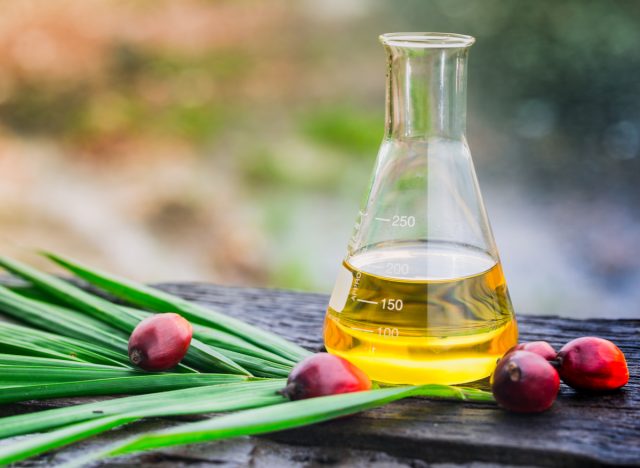
While the use of a single oil in cooking is likely not going to lead to significant health issues, it could contribute to concerns. Palm oil, for example, has a high concentration of saturated fat which has been thought to negatively impact blood cholesterol levels and increase the risk of heart disease.
Although more recent research questions exactly how negative saturated fats are for your health, they certainly don’t possess the same benefits as unsaturated fats. Because of this, you should consider limiting palm oil in your diet. Although many people don’t cook with palm oil at home, it is commonly found in processed foods, from cakes and pizza crusts to biscuits and chocolate spread. Additionally, palm oil is from a plant grown in the rainforest, and the harvesting of this oil could negatively impact the rainforest ecosystem.
Worst: Soybean Oil
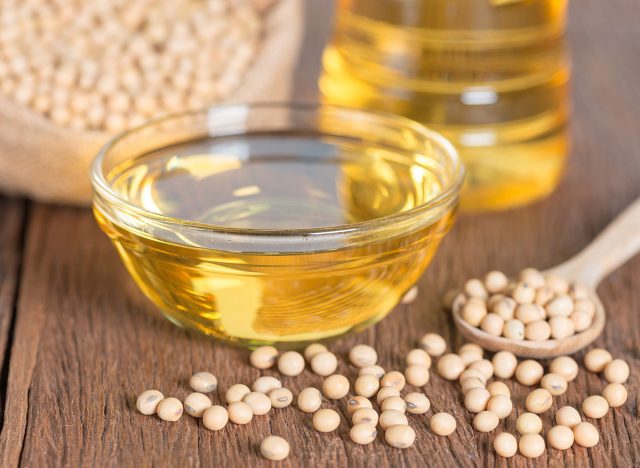
A type of vegetable oil, soybean oil is extracted from the soybean plant and processed to create oil. Although it has a relatively high smoke point of 400 degrees Fahrenheit, research indicates it may not be great for your health. One study noted soybean oil may play a role in obesity and glucose intolerance. Other research suggests the high Omega-6 content of soybean oil may also be associated with the development of digestive illnesses, such as colitis. Soybean oil may not commonly be purchased for home cooking, but it is found in a wide variety of commercially prepared products, like salad dressings, condiments, and fried foods.
Worst: Corn Oil
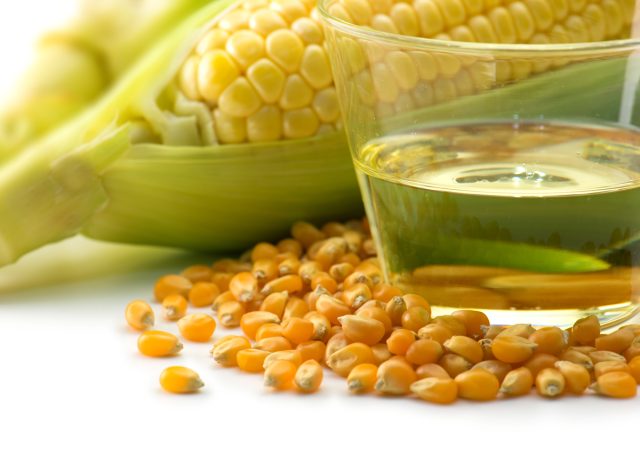
Another commonly used vegetable oil, corn oil is most often used in deep frying. Although it does contain some vitamin E, corn oil possesses several potential downsides. Its high Omega-6 content is one of the biggest concerns, especially because it isn’t notable for providing significant health benefits that can outweigh this Omega-6 concentration. Additionally, most corn oil is made with genetically modified (GMO) corn, and studies suggest GMO crops may contribute to food allergies and sensitivities. If you are considering deep-drying, use avocado instead of corn oil to improve your intake of healthy fats.
Worst: Hydrogenated Vegetable Oils

Hydrogenated vegetable oil isn’t found naturally; instead, it’s manufactured by adding hydrogen molecules to liquid oils, transforming them into a more solid form with an extended shelf life. Though this process may enhance texture, it also generates trans fats, known to adversely affect heart health and potentially elevate the risk of various diseases and conditions. Margarine, vegetable shortening, and products containing these ingredients are typical sources of trans fats. Reducing consumption of such items can significantly decrease trans fat intake, promoting a healthier diet.
Worst: Coconut Oil
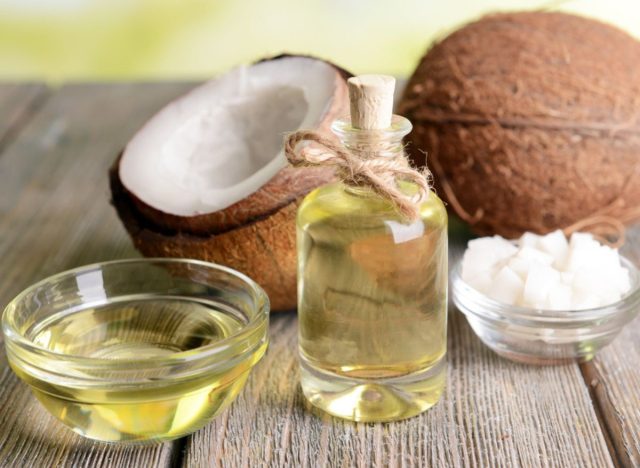
Although this oil has increased in popularity over the last decade, there are reasons you may want to limit your intake. Coconut oil has a high concentration of saturated fat, making it less ideal than other oils. Although saturated fat may not be quite as negative for our health as once thought, you should still consider limiting it in your diet as it doesn’t provide notable health benefits, like unsaturated fats.
For example, one study found coconut oil consumption resulted in higher levels of LDL and HDL cholesterol. While the increase of HDL cholesterol can be beneficial for health, it doesn’t counter the possible heart disease risk associated with the increase in bad LDL cholesterol. Because of conflicting research on coconut oil, it is best to limit your intake and instead choose oils with known health benefits more often.
- Source: Flori, L., Donnini, S., Calderone, V., Zinnai, A., Taglieri, I., Venturi, F., & Testai, L. (2019). The Nutraceutical Value of Olive Oil and Its Bioactive Constituents on the Cardiovascular System. Focusing on Main Strategies to Slow Down Its Quality Decay during Production and Storage. Nutrients, 11(9), 1962. https://doi.org/10.3390/nu11091962
- Source: Rizvi, S., Raza, S. T., Ahmed, F., Ahmad, A., Abbas, S., & Mahdi, F. (2014). The role of vitamin e in human health and some diseases. Sultan Qaboos University medical journal, 14(2), e157–e165.
- Source: LDL and HDL Cholesterol and Triglycerides | cdc.gov. (2023, May 16). Centers for Disease Control and Prevention. https://www.cdc.gov/cholesterol/ldl_hdl.htm
- Source: Jandacek R. J. (2017). Linoleic Acid: A Nutritional Quandary. Healthcare (Basel, Switzerland), 5(2), 25. https://doi.org/10.3390/healthcare5020025
- Source: Selvarajan, K., Narasimhulu, C. A., Bapputty, R., & Parthasarathy, S. (2015). Anti-inflammatory and antioxidant activities of the nonlipid (aqueous) components of sesame oil: potential use in atherosclerosis. Journal of medicinal food, 18(4), 393–402. https://doi.org/10.1089/jmf.2014.0139
- Source: Selvarajan, K., Narasimhulu, C. A., Bapputty, R., & Parthasarathy, S. (2015). Anti-inflammatory and antioxidant activities of the nonlipid (aqueous) components of sesame oil: potential use in atherosclerosis. Journal of medicinal food, 18(4), 393–402. https://doi.org/10.1089/jmf.2014.0139
- Source: Hsu, D. Z., Chu, P. Y., & Jou, I. M. (2016). Enteral sesame oil therapeutically relieves disease severity in rat experimental osteoarthritis. Food & nutrition research, 60, 29807. https://doi.org/10.3402/fnr.v60.29807
- Source: Gannon, M. C., & Nuttall, F. Q. (2006). Control of blood glucose in type 2 diabetes without weight loss by modification of diet composition. Nutrition & metabolism, 3, 16. https://doi.org/10.1186/1743-7075-3-16
- Source: DiNicolantonio, J. J., & O'Keefe, J. (2021). The Importance of Maintaining a Low Omega-6/Omega-3 Ratio for Reducing the Risk of Autoimmune Diseases, Asthma, and Allergies. Missouri medicine, 118(5), 453–459.
- Source: Saturated fat. (2023, May 10). www.heart.org. https://www.heart.org/en/healthy-living/healthy-eating/eat-smart/fats/saturated-fats
- Source: Teicholz N. (2023). A short history of saturated fat: the making and unmaking of a scientific consensus. Current opinion in endocrinology, diabetes, and obesity, 30(1), 65–71. https://doi.org/10.1097/MED.0000000000000791
- Source: Deol, P., Evans, J. R., Dhahbi, J., Chellappa, K., Han, D. S., Spindler, S., & Sladek, F. M. (2015). Soybean Oil Is More Obesogenic and Diabetogenic than Coconut Oil and Fructose in Mouse: Potential Role for the Liver. PloS one, 10(7), e0132672. https://doi.org/10.1371/journal.pone.0132672
- Source: Deol, P., Ruegger, P., Logan, G. D., Shawki, A., Li, J., Mitchell, J. D., Yu, J., Piamthai, V., Radi, S. H., Hasnain, S., Borkowski, K., Newman, J. W., McCole, D. F., Nair, M. G., Hsiao, A., Borneman, J., & Sladek, F. M. (2023). Diet high in linoleic acid dysregulates the intestinal endocannabinoid system and increases susceptibility to colitis in Mice. Gut microbes, 15(1), 2229945. https://doi.org/10.1080/19490976.2023.2229945
- Source: Gotua, M., Lomidze, N., Dolidze, N., & Gotua, T. (2008). IgE-mediated food hypersensitivity disorders. Georgian medical news, (157), 39–44.
- Source: Dhaka, V., Gulia, N., Ahlawat, K. S., & Khatkar, B. S. (2011). Trans fats-sources, health risks and alternative approach - A review. Journal of food science and technology, 48(5), 534–541. https://doi.org/10.1007/s13197-010-0225-8
- Source: Neelakantan, N., Seah, J. Y. H., & van Dam, R. M. (2020). The Effect of Coconut Oil Consumption on Cardiovascular Risk Factors: A Systematic Review and Meta-Analysis of Clinical Trials. Circulation, 141(10), 803–814. https://doi.org/10.1161/CIRCULATIONAHA.119.043052









